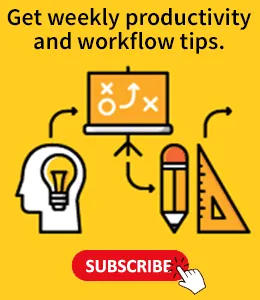How to Make Your Subconscious Work for You
Table of contents

Your subconscious mind can have a significant influence on your behavior, your actions, and your decision-making abilities. Here's how to use it to your advantage.
Take a moment to tune into your mind right now. All those thoughts, feelings, urges, and memories you're aware of at this moment? That's your conscious mind.
But your conscious mind isn't the only part of your mind. There are plenty of things going on in the background—and those background processes? That's what's called your subconscious mind.
Your subconscious mind can have a considerable influence on your behavior, actions, decision-making abilities, and, ultimately, the outcomes you experience—either positively or negatively.
But what, exactly, is the subconscious mind? How does it work? And how can you harness your subconscious mind, make it work in your favor, and use it to reach new levels of success?
How does the subconscious mind influence behavior?
Before we jump into making your subconscious mind work for you, let's quickly touch on how the subconscious mind works in general.
Your subconscious mind is like a processing facility, filtering all the information your brain receives every day—and deciding which information needs to be brought to your conscious awareness and which can go into storage. The subconscious mind is also where your belief systems and automatic thoughts and behaviors are stored.
For example, let's say you learned to drive 20 years ago. When you were first learning, you had to think about everything you were doing consciously. But after 20 years of driving experience, you don't have to think about every part of the process like you did when you were first learning; things like putting on your blinker before a turn or hitting the brakes when you want to stop are automatic behaviors. In that situation, it's your subconscious mind—not your conscious mind—that's in the driver's seat (pun intended).
The subconscious mind saves you a ton of mental energy (imagine if you had to consciously think about how to walk every time you took a step!)—which is a huge benefit. But your subconscious can also work against you.
For example, let's say a big part of your job is giving presentations. But no matter how much you prepare, you get overwhelmed with anxiety and stumble through every presentation—and you have no idea why. Your subconscious could be pulling memories, experiences, and information (for example, tripping over your words during a presentation you gave in second grade), creating a subconscious belief that you're bad at giving presentations—a thought that, while not conscious, is directly impacting your performance.
The point is, even though you aren't aware of it, your subconscious is constantly influencing what's happening in the present moment—and, depending on how it's functioning, can either be a positive or negative influence.
How to harness the power of your subconscious mind—and make it work in your favor
Luckily, there are steps you can take to make your subconscious mind an ally—and use it to drive performance, productivity, and success.
Here are three ways to harness the power of your subconscious mind—and make it work in your favor:
Control what you consume
As mentioned, your subconscious mind is responsible for processing information. That information eventually forms the belief systems and automatic thoughts and behaviors stored in the subconscious—which ultimately influences your actions, behaviors, and outcomes.
So, if you want to change your actions, behaviors, and outcomes? Start by changing the information you give your subconscious mind to process.
Choosing what information you expose yourself to can help you challenge your existing belief systems and automatic thoughts and behaviors and form new methods, ideas, and behaviors. So, for example, if you struggle with self-confidence, be intentional about consuming information that affirms you are a worthy, confident person (for example, by having close friends list all the reasons why you should be convinced or reading books about how to improve self-esteem)—and avoid any information to the contrary. Over time, your subconscious mind will form a belief system that you're a confident person—and your behaviors, actions, and outcomes will start to reflect the new, confident you.
Remind your subconscious of what you want
If you want your subconscious to help you achieve what you want in life, whether that's learning a new skill, improving your productivity, or feeling better about yourself as a person, a few (or more than a few!) reminders never hurt.
Look for ways to remind your subconscious of what you're working for and make those reminders as regular as possible. For example, if you want to land a promotion, you might put a Post-It note on your mirror listing out why you want to get promoted or set the alarm on your phone each day to write down one reason you deserve the promotion.
These regular reminders will help shape the way your subconscious mind approaches the issue at hand and can help influence it to work in your favor.
Try freewriting
If you suspect that your subconscious mind is sabotaging the things you consciously want or are working towards—and you don't know what—freewriting can be a powerful exercise to get to the bottom of the issue.
Set a timer for 10 minutes. Then, sit down and write about the issue you're dealing with for the full 10 minutes. Don't think about what you "should" write or try to edit yourself in any way; just put pen to paper (or your fingers to the keyboard) and see what comes out.
Getting your raw, uncensored thoughts out of your head and onto a page (or screen) can give you deeper insights into what's going on in your subconscious mind—and can provide you the direction you need to address those issues.
For example, let's say you're struggling with anxiety about your job—even though you can't figure out why you feel anxious. After a few minutes of freewriting, you might write down that you're feeling stressed out because some of your co-workers recently left the company or are dissatisfied with your company or job title. You may not have been consciously aware of those things affecting you, but now that you've gotten them out on paper, you can address them—and get your job-related anxiety under better control.
Use your subconscious mind to get ahead.
The mind is mysterious and complex. But now that you understand how the subconscious mind works (and how to make it work for you!) You have the information you need to navigate the mystery and complexity and leverage your subconscious to be happier, more fulfilled, and more successful—both at work and in your personal life.





